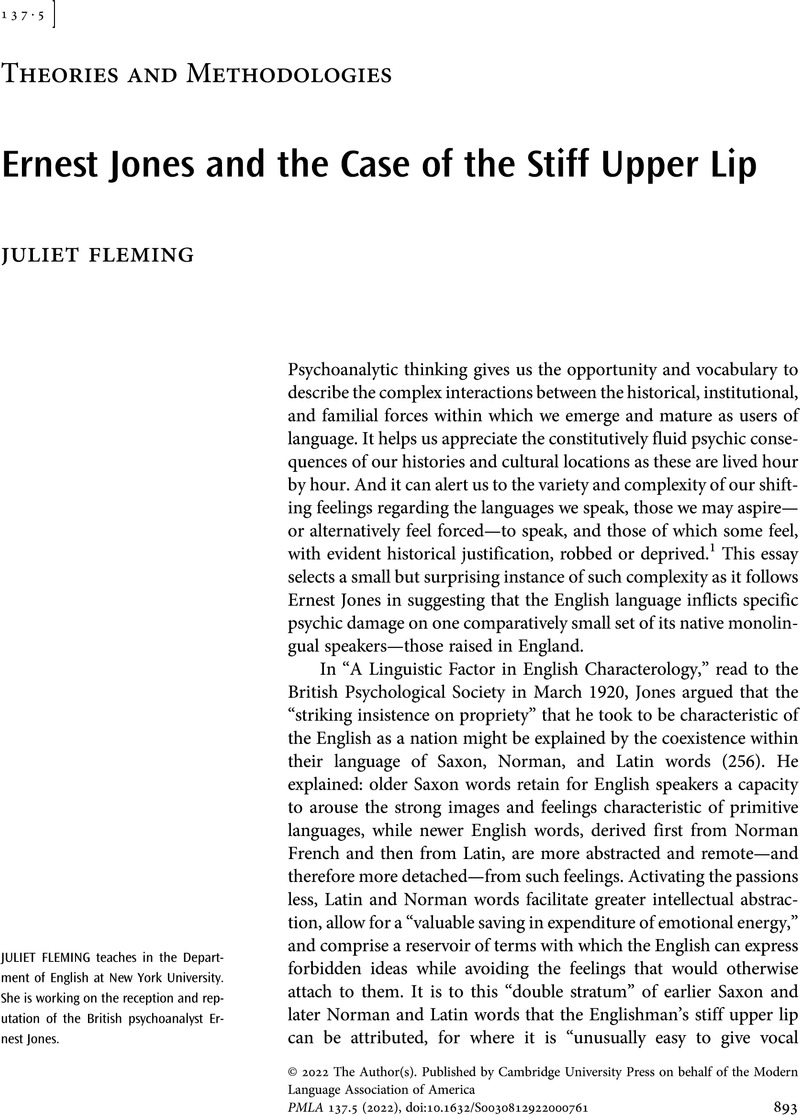No CrossRef data available.
Article contents
Ernest Jones and the Case of the Stiff Upper Lip
Published online by Cambridge University Press: 14 December 2022
Abstract
An abstract is not available for this content so a preview has been provided. Please use the Get access link above for information on how to access this content.

- Type
- Theories and Methodologies
- Information
- Copyright
- Copyright © 2022 The Author(s). Published by Cambridge University Press on behalf of the Modern Language Association of America
References
Works Cited
Abraham, K., et al. Psychoanalysis and the War Neuroses. International Psycho-analytical Press, 1921.Google Scholar
Derrida, Jacques. Monolingualism of the Other; or, The Prosthesis of Origin. Translated by Mensah, Patrick, Stanford UP, 1998.Google Scholar
Ferenczi, Sándor. “Confusion of Tongues between Adults and the Child.” Final Contributions to Psychoanalysis, edited by Balint, Michael, translated by Mosbacher, E. et al. , Hogarth Press, 1955, pp. 156–67.Google Scholar
Ferenczi, Sándor. “On Obscene Words.” Contributions to Psycho-analysis, translated by Jones, Ernest, R. G. Badger, 1916, pp. 112–30.CrossRefGoogle Scholar
Flugel, J. C. “A Note on the Phallic Significance of the Tongue and of Speech.” International Journal of Psychoanalysis, vol. 6, 1925, pp. 209–15.Google Scholar
Flugel, J. C. “Some Unconscious Factors in the International Language Movement with Special Reference to Esperanto.” International Journal of Psychoanalysis, vol. 6, 1925, pp. 171–208.Google Scholar
Forrester, John. Language and the Origins of Psychoanalysis. Columbia UP, 1980.CrossRefGoogle Scholar
Forrester, John. “1919: Psychology and Psychoanalysis, Cambridge and London—Myers, Jones and MacCurdy.” Psychoanalysis and History, vol. 10, no. 1, 2008, pp. 37–94.CrossRefGoogle Scholar
Forrester, John, and Laura Cameron. Freud in Cambridge. Cambridge UP, 2019. Frazer, James. Taboo and the Perils of the Soul. Macmillan, 1911. Vol. 3 of The Golden Bough.Google Scholar
Freud, Sigmund. Jokes and Their Relation to the Unconscious. Freud, Standard Edition, vol. 8.Google Scholar
Freud, Sigmund. Letter to Ernest Jones. 22 May 1910. Paskauskas, p. 58.Google Scholar
Freud, Sigmund. Letter to Wilhelm Fliess. 3 Oct. 1897. Aus den Anfängen der Psychoanalyse: Briefe an Wilhelm Fliess, Abhandlungen und Notizen aus den Jahren 1887–1902. Imago, 1950, pp. 233–34.Google Scholar
Freud, Sigmund. “On Transformation of Instinct as Exemplified in Anal Erotism.” 1917. Freud, Standard Edition, vol. 17, pp. 125–34.Google Scholar
Freud, Sigmund. The Standard Edition of the Complete Psychological Works of Sigmund Freud. Edited and translated by Strachey, James, 24 vols., Hogarth Press, 1953–74.Google Scholar
Freud, Sigmund. Three Essays on the Theory of Sexuality. Freud, Standard Edition, vol. 7.Google Scholar
Jones, Ernest. “The Inferiority Complex of the Welsh.” Jones, Essays in Applied Psycho-analysis, Hogarth Press, 1951, vol. 1, pp. 128–32.Google Scholar
Jones, Ernest. “The Island of Ireland: A Psycho-analytical Contribution to Political Psychology.” Essays in Applied Psycho-analysis, Hogarth Press, 1951, vol. 1, pp. 95–112.Google Scholar
Jones, Ernest. Letter to Sigmund Freud. 25 May 1925. Paskauskas, p. 575.Google Scholar
Jones, Ernest. “A Linguistic Factor in English Characterology.” International Journal of Psycho-analysis, vol. 1, 1920, pp. 256–61.Google Scholar
Jones, Ernest. “Recent Advances in Psycho-analysis.” International Journal of Psycho-analysis, vol. 1, 1920, pp. 161–85.Google Scholar
Jones, Ernest. “Review of William McDougall, An Outline of Abnormal Psychology (1926).” International Journal of Psycho-analysis, vol. 8, 1927, pp. 421–29.Google Scholar
Jones, Ernest. “Review of William McDougall, An Outline of Psychology (1923).” International Journal of Psycho-analysis, vol. 5, 1924, pp. 496–98.Google Scholar
Jones, Ernest. “The Theory of Symbolism.” British Journal of Psychology, vol. 9, no. 2, 1918, pp. 181–229.Google Scholar
Jones, Ernest. Years of Maturity, 1901–1919. Basic Books, 1955. Vol. 2 of The Life and Works of Sigmund Freud.Google Scholar
Jones, Katherine. “A Sketch of E. J.'s Personality.” International Journal of Psycho-analysis, vol. 60, 1979, pp. 271–73.Google Scholar
Jones, Mervyn. “Ernest Jones: Funeral Addresses Spoken at Golders Green Crematorium on Friday 14th February, 1958.” International Journal of Psycho-analysis, vol. 39, 1958, pp. 304–07.Google Scholar
Lacan, Jacques. Écrits: The First Complete Edition in English. Translated by Fink, Bruce et al. , W. W. Norton, 2002.Google Scholar
Maddox, Brenda. Freud's Wizard: Ernest Jones and the Transformation of Psychoanalysis. John Murray, 2006.Google Scholar
McDougall, William. The Group Mind: A Sketch of the Principles of Collective Psychology with Some Attempt to Apply Them to the Interpretation of National Life and Character. Cambridge UP, 1920.Google Scholar
Myers, Charles. Present-Day Applications of Psychology, with Special Reference to Industry, Education and Nervous Breakdown. Methuen, 1918.Google Scholar
Paskauskas, R. Andrew, editor. The Complete Correspondence of Sigmund Freud and Ernest Jones, 1908–1939. Harvard UP, 1993.Google Scholar
Phillips, Adam. On Flirtation: Psychoanalysis for the Uncommitted Life. Harvard UP, 1994.Google Scholar
Rivers, W. H. R. “An Address on the Repression of War Experience.” The Lancet, vol. 191, no. 4927, 1918, pp. 173–77.Google Scholar
Strachey, James. “Some Unconscious Factors in Reading.” International Journal of Psycho-analysis, vol. 11, 1930, pp. 322–31.Google Scholar
Winnicott, D. W. “Ernest Jones.” International Journal of Psycho-analysis, vol. 39, 1958, pp. 298–304.Google Scholar




